

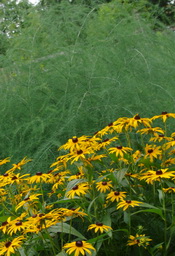
It’s raining and that’s a wonderful thing for a variety of reasons. The garden is very happy to be getting some much needed moisture. I can stay indoors and write this newsletter and I can procrastinate another day on the list of chores to do in the garden. I always like spending my time there but I have to admit that some chores provide greater pleasure than others. Right now there are a couple of big beds that really need their natural vegetation, (aka weeds,) removed. It hasn’t been done in quite a while because it has been too hot to contemplate and the soil has been so hard and dry that removing the roots of unwanted plants is a major task. This rain will actually make the chore easier. The greatest joy of this, is being able to stand up, (not always easy,) at the completion and admire the how good the bed looks. These beds have most of my Asparagus in them, as well as a range of perennial flowers and that presents me with a dilemma. If I mulch these beds heavily in an attempt to control the weeds, will that slow their spring warm up and thus delay the start of the Asparagus harvest next spring. It may only be a few days but when it is the first fresh vegetable of the year, those days seem very important. Maybe I should get them both weeded and mulch one of them to see how much difference it makes to the Asparagus. It’s at this point that I wisely decided to hit the “save” button and thus discovered that this issue of “Dallying In The Dirt” is a bit of a milestone in that it is the 100th issue of my newsletter. Looking back I can see that the first was produced in February of 2007 some four years ago and I’m amazed that my goal of every two weeks, 25 issues a year, has been reasonably well maintained. I do hope that all of my readers, and there are a great many more now than there were for issue #1, enjoy the insights into my garden and tips for yours, as much as I enjoy producing “Dallying” for you. Your feedback and questions have been delightful and I hope we can continue this dialogue for some time to come. 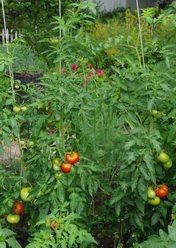 Vegetable gardening is such a feast or famine adventure. I have waited, not very patiently, for Zucchini and especially Tomatoes and now I have many more than we can eat. Interestingly, giving away excess Tomatoes seems to be much easier to do then excess Zucchini. I understand that the sales of bacon increase noticeably at this time of year. I know that I will buy my usual package or two of this tasty but not so healthy item so that I can indulge in my favourite bacon and Tomato sandwich. We have some chicken bacon (surely an oxymoron,) in the fridge, in an attempt to eat healthier and we’ll see how it fares as one of my sandwich’s ingredients. There are many other things to do with this delicious fruit and I will be picking some of my Basil crop in order to make my Tomato Basil Salad.
Vegetable gardening is such a feast or famine adventure. I have waited, not very patiently, for Zucchini and especially Tomatoes and now I have many more than we can eat. Interestingly, giving away excess Tomatoes seems to be much easier to do then excess Zucchini. I understand that the sales of bacon increase noticeably at this time of year. I know that I will buy my usual package or two of this tasty but not so healthy item so that I can indulge in my favourite bacon and Tomato sandwich. We have some chicken bacon (surely an oxymoron,) in the fridge, in an attempt to eat healthier and we’ll see how it fares as one of my sandwich’s ingredients. There are many other things to do with this delicious fruit and I will be picking some of my Basil crop in order to make my Tomato Basil Salad. 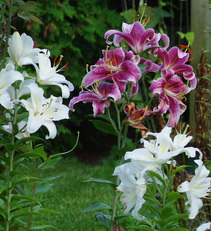 My Oriental Lilies are in full bloom at the moment. They are the last of the Lily types to bloom but the flowers are worth the wait. They do have one problem and that is their very slow propagation rate. A single bulb will produce a single bloom stalk and will continue to do so for several years. When crossed with some of the other Lilies, like the Trumpets, to give us the Orienpet Lilies the blooms are as wonderful and the bulbs divide and reproduce at an astonishing rate. These Lilies bloom a little earlier than the Orientals but their size and growth rate are amazing. Now if we could just get them to bloom a little later.
My Oriental Lilies are in full bloom at the moment. They are the last of the Lily types to bloom but the flowers are worth the wait. They do have one problem and that is their very slow propagation rate. A single bulb will produce a single bloom stalk and will continue to do so for several years. When crossed with some of the other Lilies, like the Trumpets, to give us the Orienpet Lilies the blooms are as wonderful and the bulbs divide and reproduce at an astonishing rate. These Lilies bloom a little earlier than the Orientals but their size and growth rate are amazing. Now if we could just get them to bloom a little later.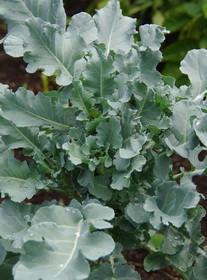 The very hot summer here has contributed to a great lack of vegetables belonging to the cabbage family. They are mostly cool season crops and really don’t like the heat. The cabbage themselves seem to be doing well but anything like Broccoli, that needs to start a bloom cycle, is just curling up in a blasted bud and producing nothing edible. I have a few new seeds started and I will try cutting back the large non-productive plants to see if the new growth yields any heads of Broccoli as the weather, hopefully, gets cooler as we head towards fall. Gardening seems to teach me something new every year. Just when I think I have it figured out the next year throws me another curve to sort out.
The very hot summer here has contributed to a great lack of vegetables belonging to the cabbage family. They are mostly cool season crops and really don’t like the heat. The cabbage themselves seem to be doing well but anything like Broccoli, that needs to start a bloom cycle, is just curling up in a blasted bud and producing nothing edible. I have a few new seeds started and I will try cutting back the large non-productive plants to see if the new growth yields any heads of Broccoli as the weather, hopefully, gets cooler as we head towards fall. Gardening seems to teach me something new every year. Just when I think I have it figured out the next year throws me another curve to sort out.Time to answer a few questions and then get back into the garden. If you have a gardening question just ‘reply’ to this newsletter and send me your query. I try to answer most of the questions and the ones that I answer here are those that I think will have the widest interest. You can also find the latest garden updates on the front page of gardening-enjoyed . Pat Asks ? Hi, really glad to read about dividing the iris as I had some poor performers this year. Now, are grasshoppers big eaters? Something has done a number on a perennial hibiscus (eating foliage) and I know what it is not but have seen a couple of large, ugly grasshoppers and suspect that could be the culprit. I also have a tomato plant and cucumbers that I have been guarding more closely since I saw the grasshopper(s). What do you think? Pat in very hot Memphis, TN Ken Answers! Grasshoppers do indeed enjoy a good vegetable snack. They are usually not a problem in small numbers because they are not that voracious but remember the biblical “plague of Locusts” which are just a species of grasshopper. I have never seen them eating Tomatoes and Cucumbers, they prefer members of the grass family but in extreme conditions anything can happen. Janice Asks? I was wondering if you have noticed an orange beetle on your daylilies this year. It is about as long as the red lily beetle, but is much thinner, more delicate looking. It has one shade of orange on the head and a lighter shade on the elongated body. I can't tell yet how much damage if any it is doing, but it seems to be only on the daylilies. Ken Answers! No. I have not noticed a beast like the one you describe and my research among my Daylily growing friends has not produced any similar sightings. If any of my readers have noticed this new neighbour maybe you could do us all a favour and send the info and possibly a picture. We can always learn from each other. 111 Trent St. W. Whitby ON L1N1L9 |
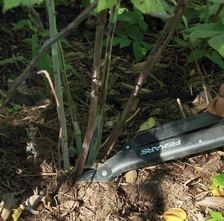 The
The 